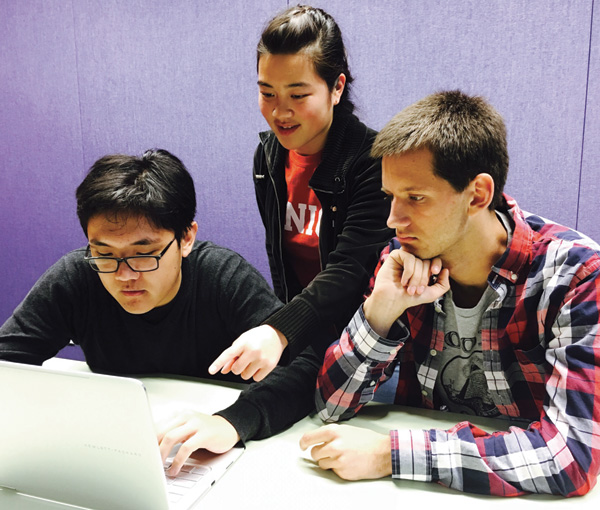Teens Teach Computer Science at a CA Library

A teen coding mentor provides instruction to a first-time programmer.
Matt Lorenzo remembers the three high school sophomores who came to talk with him about launching a teen tech symposium in the Santa Clara (CA) County Library District (SCCL) three years ago. He sent them home.
“I wanted them to think the idea through,” explains Lorenzo, teen services librarian at SCCL’s Cupertino branch and a former public school teacher. “I had them go back and prepare a 10-minute proposal.”
Undeterred, the teens, members of an academic club at Santa Maria High School, returned with a presentation. Lorenzo liked what he saw. The result? Peer-to-peer programming at the library, attracting hundreds of students a year to coding classes on Java and Python, lectures from tech and science experts, and a hackathon where teens pulled an all-nighter to develop apps.
The free events aimed at middle and high schoolers are organized, taught, and mostly staffed by teens. Students come from high schools across Silicon Valley—including Cupertino’s Santa Maria High School and Homestead High School (the latter is Steve Wozniak and Steve Jobs’s alma mater). Invited speakers include local tech company employees and other professionals, such as a forensic analyst from the police department.

Peer coaching at the Cupertino library
The Cupertino branch provides program rooms; larger groups shift to the next-door Cupertino Community Hall. The teens running the show establish a loose vibe, says Lorenzo. No one worries about homework or whether what they’re learning will be on a test; the focus is on fun. “That makes it much more relaxed,” says Lorenzo.
Skeptical librarians might assume that the Cupertino library’s location—less than two miles from Apple headquarters and about 11 from Google’s—gives it an edge with tech programming. But Lorenzo says no.
“I don’t think it’s specific to Cupertino,” he says. “It’s [about] extending yourself out to the teens, doing the research, and making contacts to see what the best fit is and what addresses teens’ needs.”
That assessment led to the library branch’s first hackathon last June, when 143 teens competed to build apps and content during a 12-hour marathon. Teens age 14–18 filled the sign-up spots within seven hours.
A panel of judges, including representatives from Cupertino’s city council, the local library foundation, and Hewlett-Packard, assessed the 31 resulting projects that addressed the social, educational, and health-related needs of teens.
A website for young adults that listed ways to de-stress nabbed the “best in health” prize. “Best educational hack” went to Nite Owl, an app that detects if a studying teen stops moving and nods off. The app sets off alarms to wake the dozing student.
For Lorenzo, the real win was watching teens working together, diving in full force, and enjoying themselves—and learning from peers. “It’s awesome,” he says. And “it continues to grow.”
RELATED
The job outlook in 2030: Librarians will be in demand
The job outlook in 2030: Librarians will be in demand
ALREADY A SUBSCRIBER? LOG IN
We are currently offering this content for free. Sign up now to activate your personal profile, where you can save articles for future viewing






Add Comment :-
Be the first reader to comment.
Comment Policy:
Comment should not be empty !!!